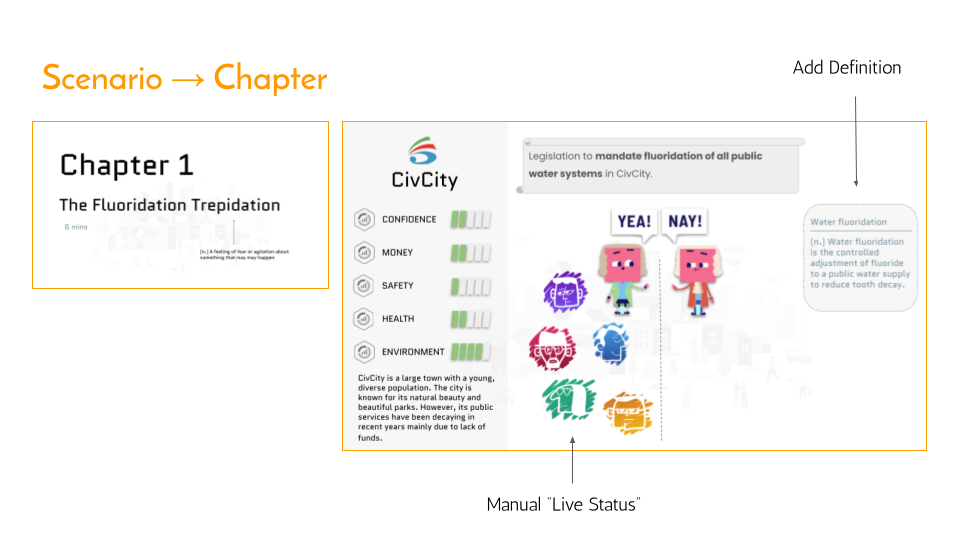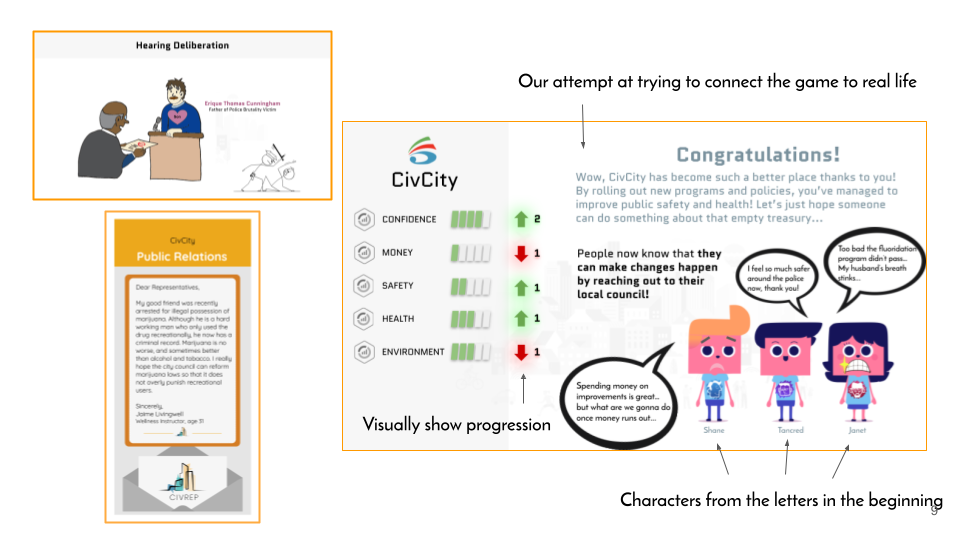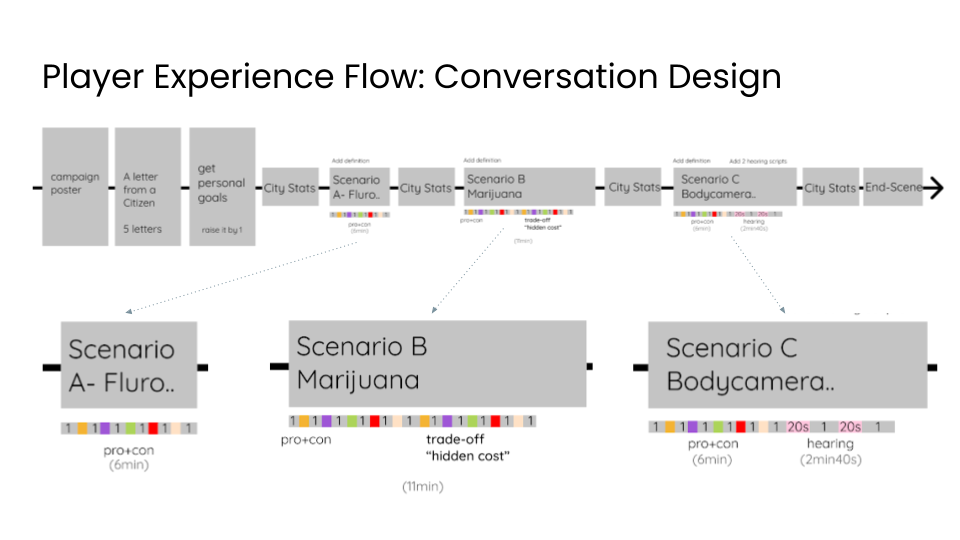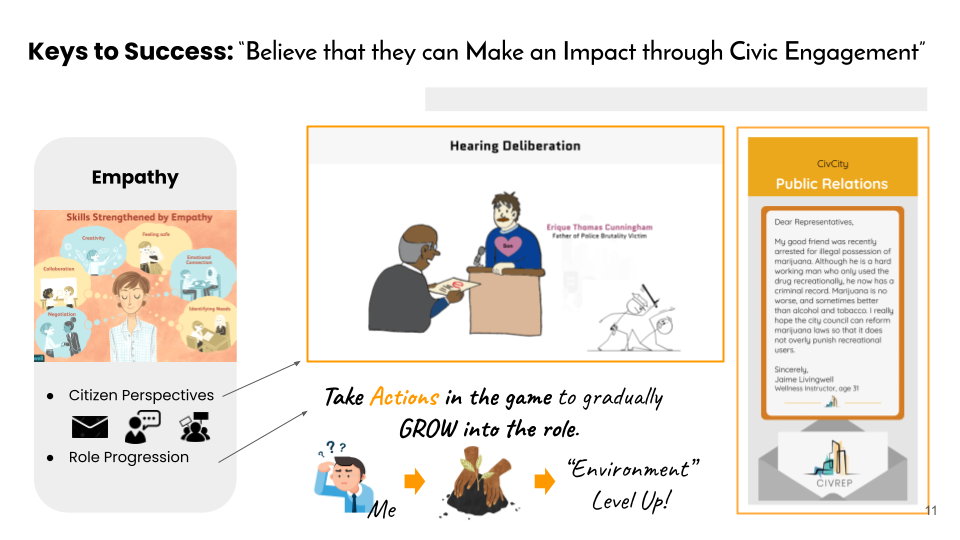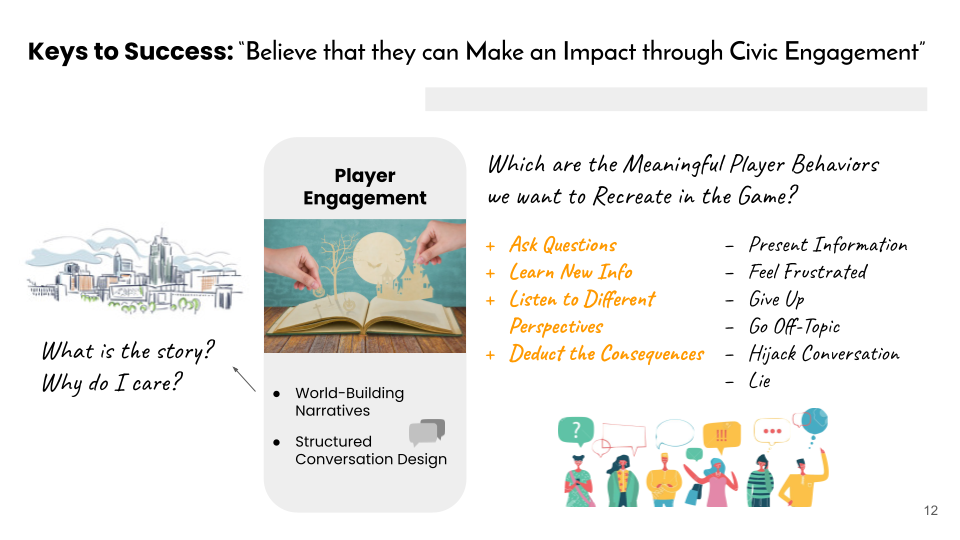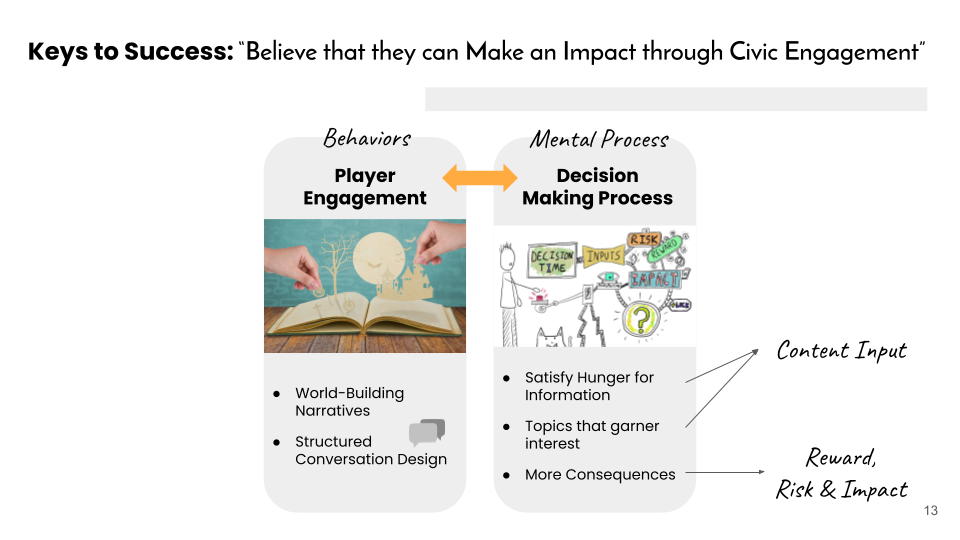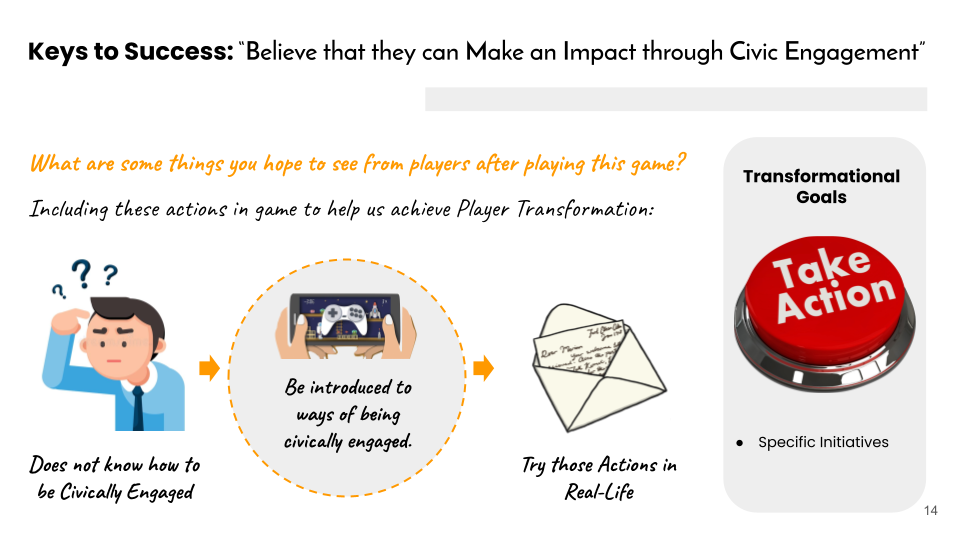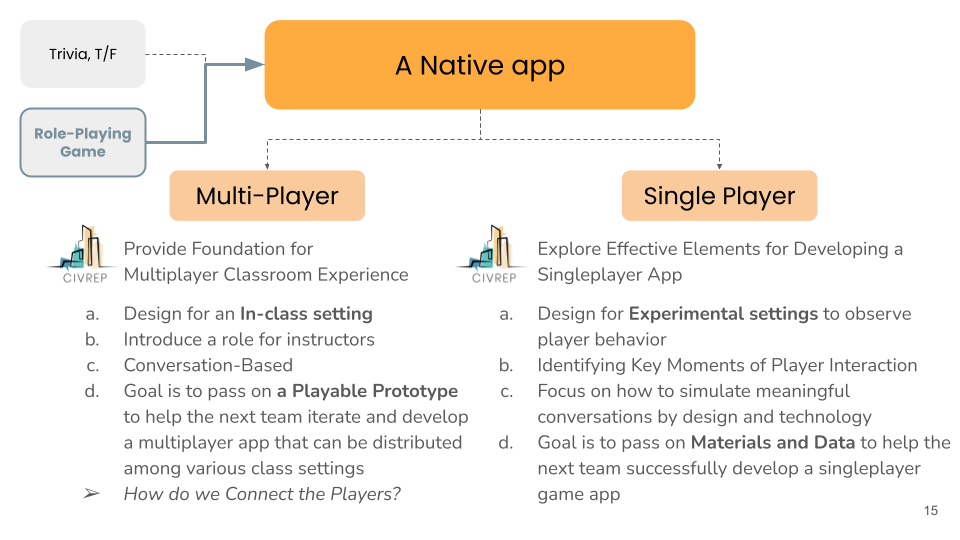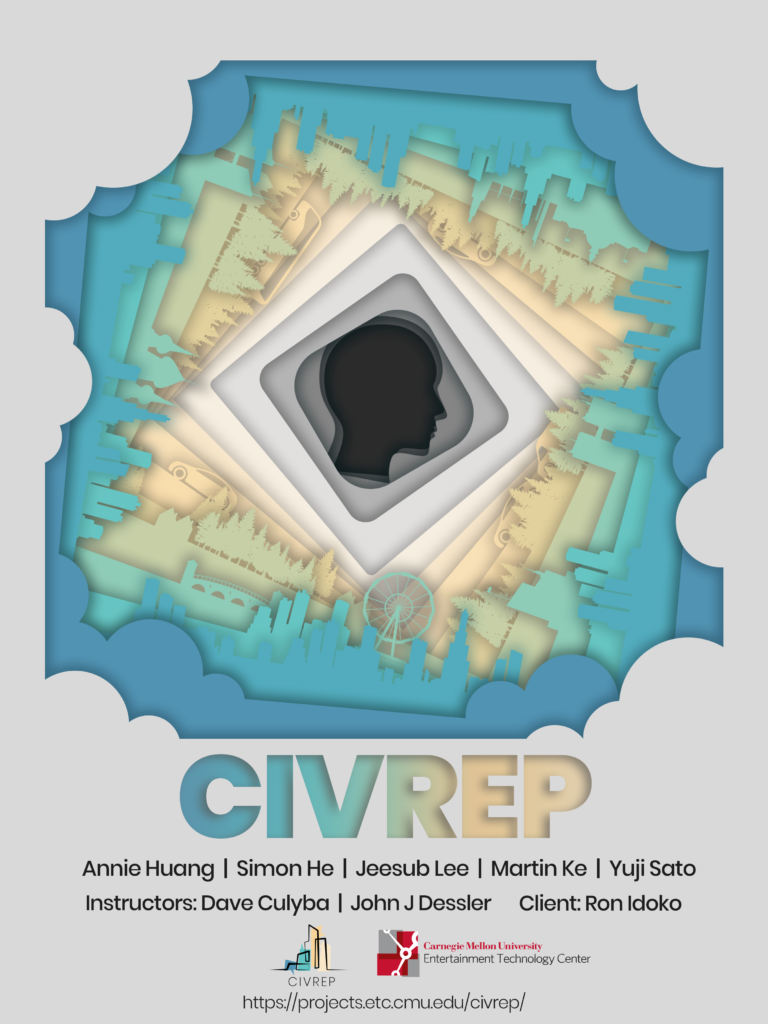Additional Playtests
For week 5, we took our learnings from the previous weeks and conducted another playtest.
The playtest was run in the following format:
- Simulating AirConsole on Zoom with Google Slides and Slack
We mentioned last week that we would be using AirConsole as our platform. One thing we wanted to definitely test was how CivRep could work with AirConsole’s separate screens, the biggest question being how we could best present the large amount of information in our game through a mobile device. In order to quickly test our concepts, we decided to simulate AirConsole by prototyping with google slides, using Zoom’s share screen function, and Slack direct messages!
Here is a quick peek at how this looked.



5 guests were invited to playtest our game, and they went through the following steps.
1. Character Selection
Guests were given a quick introduction to the game, then asked to choose a character. Each character had a unique background and specialization which would affect what kind of information they would receive later in the game. After guests chose their characters, we sent them information pertaining to their role to their phones through Slack.
2. Explanation
We then explained the basic game mechanics to our playtesters, such as the voting system and how city metrics work
3. Chapters
For the playtest, we prepared three chapters where a bill was introduced in each one and the guests had to discuss whether or not they want to pass this piece of legislation.
4. End Results
Lastly, we prepared a final screen where guests were able to see the results of their decision making on the city metrics, and how citizens responded to their choices.


The main features we were looking to test were the following:
Introducing Citizen Perspectives
Although our game is very good at making the guests feel like city council representatives, we found that this roleplaying was not very well connected to university students, our target audience. By bringing in citizen perspectives to our experience, we hoped to increase engagement by introducing something more relatable for our guests.
Some of the things we included were:
Letters
We sent out a ‘letter’ from a citizen talking about their thoughts and concerns to each guest at the beginning of the game.
Hearings
In one of our scenarios, we held simulated ‘hearings’ where witnesses and experts were called in to talk about the issue at hand.
We hoped that such additions would not only improve guest engagement, but also serve our transformational goal of creating civically engaged citizens by introducing accessible ways through which guests could have their voices heard in real life.
- Conversation structure
CivRep’s most powerful gameplay feature is the conversation between the guests during the experience. We tried to discover positive and negative conversation behavior, and how to best facilitate and encourage conversation, by trying out different ways of structuring and designing said conversation in the game.
- Narratives and World-Building
Lastly, our team worked on including some narrative and world-building elements in this prototype. By including things such as the aforementioned letters and hearings, as well as having little bits of exposition and conclusions to each scenario, we hoped to increase guest engagement.
Takeaways
Our team learned a great deal from this second playtest, and our takeaways can be sorted into four major categories: Empathy, Guest Engagement, Decision Making Process, and Transformational Goal
Empathy
Introducing citizen perspectives was quite successful, with most of our playtesters mentioning the letters and hearings as quite engaging and thought provoking. It also seemed to serve our transformational goals quite well, with some guests mentioning that they learned about how they could reach their representatives. In our future iterations, researching for more citizen perspectives we could include, and exploring how we could expand on the already existing features will be one of our priorities.
On the other hand, we found that the roleplaying experience was not as well received by our guests. One interesting feedback we received was that guests “felt like they were placed in their roles, instead of growing into them.” This feedback highlighted one of the major flaws with our design: CivRep does not currently have a way for guests to roleplay beyond the surface level. When the guests select a character, they are not given the information needed to make an informed decision. Thus, when they are presented with their character’s preset personal leanings, all they can do is follow this pre-scripted path. The current characters are too unclear and rigid for players to be able to roleplay well. In the coming weeks, exploring how to make the roleplaying experience more flexible, clear, and fun for our guests will be a top priority.
Player Engagement
We found that world-building and narratives greatly helped with guest engagement. The letters, the hearings, and the little bits of narrative before and after each scenario helped make CivRep feel more alive for our playtesters. We believe that continuing on this path of improving storytelling and world building will help make the experience more engaging for all guests.
We also witnessed the importance of conversation structure and information sharing. Some key takeaways were that:
- Giving information allows people to actively engage in conversations
- Sometimes the information provided was not enough for guests to make an informed decision
- Guests did not have enough time to both receive information and converse.
- The timing at which we gave information was important to overall conversation flow
Decision Making Process
In our post playtest discussion, our guests told us that personal opinion was still the greatest factor in their decision making. From this, we realized that in order to make CivRep a more transformational experience, we would need a better understanding of our guests’ decision-making process.
Some of our observations were:
Find topics which garner interest
We discovered that topics the guests were interested in resulting in much more lively and active discussions.
Satisfy hunger for information
Our guests were not always satisfied with the information we gave them. Some found the data they received unclear, while others seemed to find the facts and knowledge not worth reading. Going forward, our team will explore how we can make the information we present more digestible and meaningful for our guests.
More consequences
The guests did not feel like their decisions actually had an impact on the game. Although this was somewhat alleviated by our end screen and some writing, it was not enough to make the guests feel like they can truly make a difference. One interesting thing a guest mentioned was having short term and long term consequences for each scenario that better represents the impacts of various decisions. In future iterations, making the decision making and consequences feel heavier and more impactful for our guests will be one of our major priorities.
Transformational Goal
Lastly, this playtest showed us one way through which we could achieve our transformational goal.
By discovering other specific initiatives that we could include in our game, we can better facilitate the guest transformations we desire.
Delivery or Discovery
After conducting two playtests and organizing the data we got from both, our team realized that we will have to better define our deliverables for the semester. Overall, we saw two main directions we could go:
- A more delivery oriented approach where we iterate and polish up our experience into a classroom teaching tool
- A more discovery oriented approach where we explore possibilities of a singleplayer experience
After much discussion with our client, instructors, and among the team, we have decided to go with the singleplayer approach where we will explore how CivRep’s multiplayer game behavior could be simulated on a singleplayer mobile app.
Also, CivRep now has a logo and poster created by our fantastic artist Xin (Simon) He!
